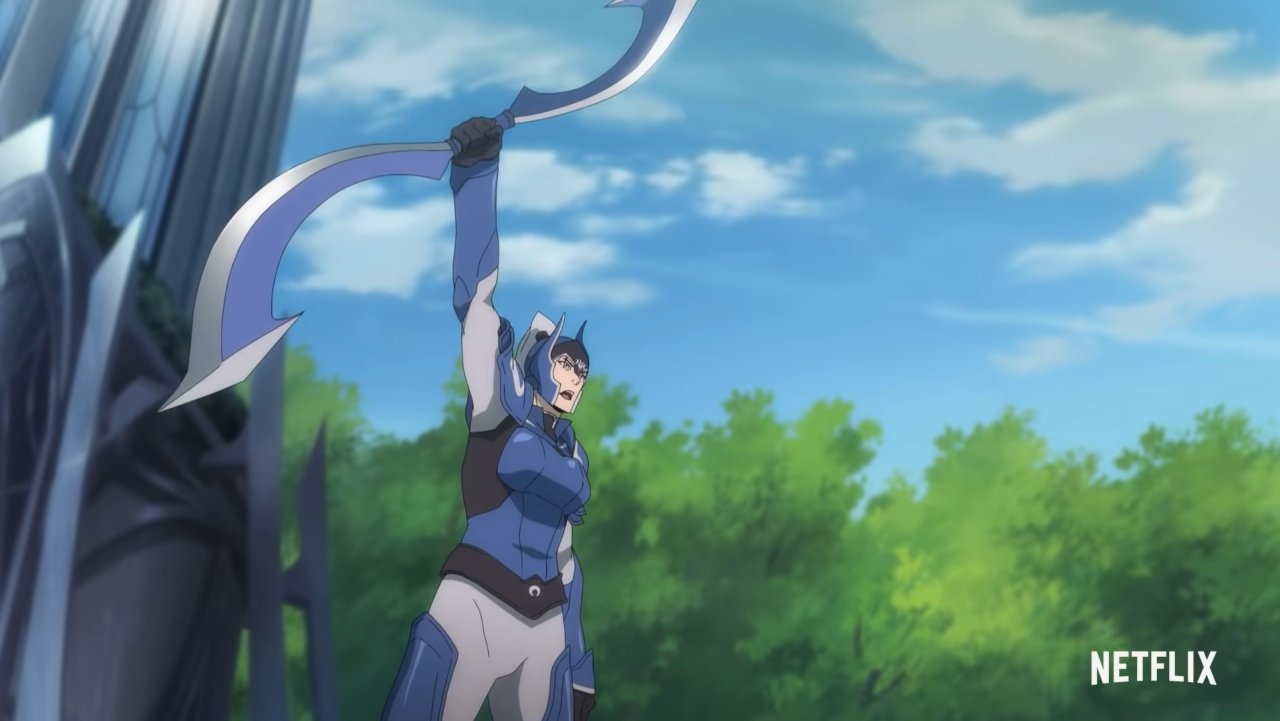Dino Meneghin wasn’t prepared for Dota. Admittedly, Valve’s multiplayer online battle arena is an intimidating thing. Within the gaming space, few titles can compete. Player counts, online viewership, esports prize pools – Dota contends for the crown on all fronts. With millions of players charging into battle each month, stepping up to score the title’s first-ever Netflix adaptation as a video game outsider was a daunting task.
Fortunately, Meneghin has been twiddling with synthesizers longer than most of us have held a controller. As such he was perfectly placed to not just immerse himself in a brand new world, but deliver the show its own, unique sound. We sat down with the Dota: Dragon’s Blood composer to discuss mind maps, elder magic, and how he brought his own style to a beloved video game universe.
An interview with Dino Meneghin, Dota: Dragon’s Blood composer

© Netflix
Prior to Dragon’s Blood, Meneghin is best known for his work on the Teen Wolf TV series. But it was his more recent efforts on Amazon’s horror anthology Lore that earned his place in Dota’s arena. Impressed with his work, executive producer Ashley Mirror invited Meneghin to meet after production had finished to discuss his next project, a tempting fantasy animated series for Netflix.
“I didn't know until that meeting what Dota was,” Meneghin admitted. “I was never really a gamer. I have such a short attention span that even gaming takes too long for me. So like, when I want to distract myself, I just get another synthesiser or something. And after the meeting, he told me the story and what he was doing, and I really didn't understand it. My wife was asking me ‘what's the show about?’ And I said, ‘I don't know! I think there's dragons, he said something about elf sex. I don't know – it sounds cool!’”
That excitement rapidly gave way to shock and disbelief as Meneghin went home to research more about the game. Knowledge of a game is one thing, but uncovering its gigantic following and towering competitive prize pools is another entirely.
“I saw one [tournament] that was like, $35 million,” Meneghin exclaimed. “I was like, 'What the fuck!' The viewership, it's as much as the World Cup! I'm not an idiot, I know esports exist but I never really dived into it. It was just finding this, you know, enormous thing that I just knew nothing about.”

© Netflix
That initial astonishment only grew as Meneghin began to investigate the surrounding world and lore which lays the backdrop to each contest between the Radiant and Dire.
“There's a lot of different storylines that all sort of weave together, so it took me a while,” said Meneghin. “I asked for a show Bible, so they just gave me all of the drawings and scripts – every resource they had before I'd seen any of the animation. And I just started sketching music based on that. I had maps on my wall of, you know, just anything to kind of get my head around the world. I literally had string diagrams about how that character relates to this character this way, and this character opposes this character. I don't think I've ever done something that had quite such an intricate lore to it.”
Taking on such a hefty and unfamiliar project, you might expect a composer to fall back on standard expectations from the fantasy genre; a rousing orchestral score fit for the clash of blades, claws, and magic. However, Ashley and Meneghin had a very different sound in mind.
“Ashley Miller, his big touchstones were Tangerine Dream, Vangelis, and a lot of early Michael Mann movies,” Meneghin said. “And we talked about Goblin’s score to Suspiria. He threw those at me, which is great for me because I'm a huge Kraftwerk fan and I love synth-based stuff. So I said to him, okay, what if we just don't do an orchestral score? That's what everybody would typically do for this genre.
“I wanted to do it as a completely distinct thing. The show lore is obviously based on the lore from the game, but Dota kind of evolved over time. It's not like it came out as this fully formed thing. I actually purposely did not listen to [Dota 2 composer Tim Larkin’s] music for quite a while, until I had the style of the show established. Once I had that established, then I actually talked to Tim, and he was very gracious with his time with me.

© Netflix
Thankfully. Larkin was more than supportive of Meneghin’s aims, even pointing out that, in many ways, Dota is the perfect realm in which to experiment with non-traditional styles.
“Part of what he explained to me was that there are these user music packs,” said Meneghin. A lot of people play the game with completely different music and some people play it with no music at all. It wasn't like everybody was having this particular experience with the music.
“What I was trying to do is basically not have it be a fantasy show. Because there's a lot of high magic, but there's a lot of metaphysical stuff and sci-fi too; I tend to lean heavier into that stuff. There’s no reason to do another fantasy score. I mean, Lord of the Rings – you can still watch it. There's no reason for me to try to do it, you know what I mean?”
While Larkin was receptive, playing some early arrangements to Netflix and Valve offered another chance for reservations to arise.
“At first there was a little bit of hesitation,” Meneghin explained. “Because, you know, they were kind of like, well, we kind of thought you were going to do a fantasy score. This is not a fantasy score. Ashley was very supportive and had a very strong idea of what he wanted. And so he really got everybody on board with the music.”

© Netflix
The resulting conversations, however, provided Meneghin with some pivotal feedback. Feedback which would go on to define the heart of the show’s atmosphere.
“After we did the first episode we had a conference call with Ashley, me, and Valve,” said Meneghin. “And you know, they actually had a really helpful suggestion. Essentially what we ended up on was that when we're in moments of high magic, let's bring the synths and all that stuff to the forefront.
“There was a travelling scene and I’d done the whole thing very synthy. Their take was that there's no reason, nothing to motivate the electronic aspects of this, if they're just travelling. Save that for the high magic. I had gotten kind of wrapped up in this idea of we're not gonna use orchestra, we're gonna do all synth! In a lot of ways that suggestion from Valve ended up helping to satisfy everybody; it just made the score flow more naturally. Sometimes you can just force a concept, and sometimes you realise you just don't have to reinvent the wheel.
Valve may be the creator of Dota 2, but they are far from the only keeper of its soul. Video game fanbases are known for the strength of their passion. That can be a wonderful thing, but put a step wrong and you risk finding yourself on the end of a defensive backlash that can border on frenzied. Fortunately, Meneghin has been through the flames already, having dallied with the only community with a furnace of fans more fiery than gaming: podcasting.
“I did another show called Lore that was based on a podcast property with a big following,” said Meneghin. “We had a lot of negative reactions! ‘Why wasn’t the composer from the podcast doing the music, why is the story so different, and where is the narrator that I liked?!’ The great part of this job is that I love it, but one of the tough parts is that if or when you fail, you fail in public. At the end of the day, all I can do is do my homework so that I’m not walking into something that I don’t understand.”

© Netflix
Thankfully, Meneghin’s efforts appear to have paid off, with fans and newcomers to Dota enjoying the score and complex world.
“All of us tried really hard to operate in good faith with the gaming community. Meneghin said. “We weren’t just going ‘we’re going to take this and totally change it.’ Even though I did something new, it wouldn’t have made sense to do the score that Tim did, because the show wasn’t the game. So yes, there was a lot of pressure. I’ve been really relieved and excited to see that some of what I’ve seen online has been a really positive reception to the score. I’m really happy that people like it!”
We’d like to thank Dino Meneghin for taking the time to answer our questions. If you're interested in keeping up to date with his work, be sure to follow him on Twitter. Dota: Dragon’s Blood is available to stream on Netflix. Dota 2 is available to play on PC, via Steam.




